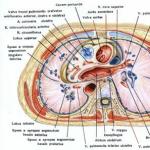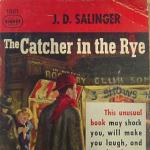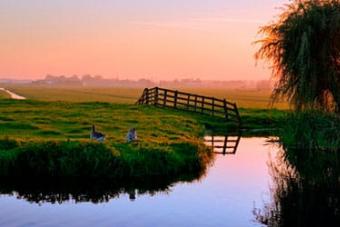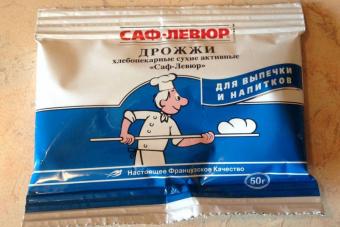Used before singular and singular nouns plural when we are talking about something specific, specific.
The criminals robbed the bank . – Criminals robbed a bank (of some specific kind).
Please close the door. – Please close the door (not any door in the house, but this door).
In other words, if you can add “some” before a noun, then it will not be definite article, and if “the same one \ those same ones” fits, then a definite one.
The definite article is also used with nouns that mean:
1. Something unique, existing in a single copy
the Sun - the sun,
the Columbia river - the Columbia River.
(about the article before proper names, see below)
2. Periods (segments) of time
in the morning - in the morning,
in the past - in the past.
3. Before adjectives in the superlative degree
the biggest mall in Moscow – the biggest shopping mall in Moscow.
The article can quite significantly change the meaning of the entire sentence. For example:
I met a girl yesterday. – I met a girl on the street (I was just walking and saw some girl).
I met the girl yesterday. – I met a girl yesterday (I saw THAT SAME girl, for example, the love of my life).
Zero articles in English
In some cases, the article is not used at all before the noun, for example:
1. It means something very general
Crime and punishment. – Crime (in general) and punishment (in general).
Life is strange. – Life is strange (life in general).
2. Before the names of days of the week, months, seasons
See you on Monday. - See you on Monday.
August is the last month in summer. – August is the last month of summer.
3. Before words denoting food intake
Let's have breakfast. - Let's have breakfast.
Lunch is ready. - Lunch is ready.
Article before proper names
Difficulties with articles arise when we are faced with the issue of using articles before proper names. You probably noticed that, for example, there is no article before some geographical names, while others are preceded by the. Let us first consider when articles before proper names are not needed.
When the article is NOT placed before a proper noun
In most cases, articles are not used before proper names. A proper name means certain person or an object, this is understandable without an article, so usually the article is not needed.
Here are examples of such cases:
1. Before names.
Jonh, Misha Sidorov, Lewis.
2. Before names with a form of address or title, degree, etc.
General Pupkin, Professor Pavlov, Mr. White.
3. Before common nouns that serve as addresses.
Essentially, they are treated as a proper noun:
How are you doing, sergeant? - How are you, Sergeant?
How can I help you, professor? - How can I help you, professor?
4. Before the names of family members, if they are used by members of the same family.
In such cases, the words father, mother, sister, etc. are used practically as proper names.
Let's see what mom says - Let's see what mom says.
I’ve got to ask father about it - I have to ask my father about this.
Note: the word “mother” is written in the USA mom, and in Great Britain - mum.
When an article is needed before a proper name
There are cases when proper names are preceded by article the. There is not always a pattern in them, here are some typical cases:
1. Before plural surnames meaning “such and such a family”:
The Whites live in Albuquerque – The Whites (the White family) live in Albuquerque.
Have you invited the Petrovs? – Did you invite the Petrovs (Petrov family)?
2. Before some geographical names.
This is a rather confusing point, since in the use of the article before toponyms, in some places there are patterns, in others there are not, and in others it is possible both ways. For example, on maps, articles are never written before names to save space. About some general patterns and exceptions are well explained in this video from Puzzle English:
My personal note: I never tried to remember all the nuances of using articles before geographical names. And here's why. I use them very rarely in speech, and if I do use them, they are the same ones (I’m from Russia). Even if I memorize everything that Anton talks about in the video, I will still happily forget most of it, because this knowledge is rarely useful. I don’t see anything wrong with looking in a reference book or Googling in a difficult situation. When I write in Russian, I often have to turn to reference literature (anyone who writes something by line of work will say the same thing), let alone talk about foreign languages.
English articles in set expressions
There are a number set expressions, in which the definite or indefinite article is used.
| Set expressions with the indefinite article A/AN | |
|---|---|
| a few | some |
| a little | A little |
| a lot of | many |
| a great deal of | many |
| a good deal | many |
| as a rule | as a rule |
| as a result | as a result |
| as a matter of fact | as a matter of fact |
| at a speed of | at speed |
| at a time when | while |
| for a while | for a while |
| for a long (short) time | for a long (short) time |
| in a low (loud) voice | in a quiet (loud) voice |
| to be in a hurry | hurry |
| to go for a walk | go for a walk |
| to have a cold | have a cold |
| to have a good time | have a good time |
| to have a mind | mean |
| to have a look | take a look |
| to have a smoke | light a cigarette |
| to have a rest | relax |
| to take a seat | sit down |
| to tell a lie | lie |
| It is a pity | sorry |
| It is a pleasure. | With pleasure. |
| What a shame! | What a shame! |
| Set expressions with the definite article THE | |
| by the way | by the way |
| in the morning | in the morning |
| in the afternoon | during the day |
| in the evening | In the evening |
| in the country | outside the city, in the village |
| in the past | in the past |
| in the present | in the present |
| in the future | in the future |
| in the distance | in the distance |
| in the plural | plural |
| in the singular | singular |
| in the street | on the street |
| just the same | the same |
| on the one hand… on the other hand | on the one hand... on the other hand |
| on the right (left) | right (left) |
| in the whole | in general, in general |
| out of the question | impossible, out of the question |
| on the other day | the other day (in relation to the past) |
| the day after tomorrow | day after tomorrow |
| the day before yesterday | day before yesterday |
| to go to the theater (the cinema) | go to the theater (cinema) |
| to go to the country | go out of town |
| to pass the time | spend time |
| to play the piano (guitar, violin, etc) | play the piano (guitar, violin, etc.) |
| to tell the truth | tell the truth (but speaking about lies – to tell a lie) |
| to tell the time | tell what time it is |
| to the right (left) | right (left) |
| What is the time? | What time is it? |
| Set expressions WITHOUT articles | |
| to ask permission | ask permission |
| to be in bed | lie in bed, get sick |
| to be at home | be home |
| to be at school | be at school |
| to be at table | be at the table (at the meal) |
| to be in town | be in town |
| to be on holiday | be on vacation |
| to declare war | declare war |
| to go by water (air, sea, land) | travel by water (air, sea, land) |
| to go home | go home |
| to go to bed | go to bed |
| to go to school | go to school (study) |
| to go to sea | become a sailor |
| to go to town | go to town |
| to keep house | run a household |
| to leave school | finish school |
| to leave town | leave town |
| to make haste | hurry |
| to make use of | use |
| to play chess (cards, hockey, etc.) | play chess (cards, hockey, etc.) |
| to take care | take care |
| to take part | participate |
| to take place | happen |
| to go by bus (car, train) | go by bus (car, train) |
| at breakfast (dinner, supper) | at breakfast (lunch, dinner) |
| at hand | at hand |
| at home | Houses |
| at night | at night |
| at peace | in the world |
| at present | currently |
| at school | at school (in class) |
| at sunrise | at dawn |
| at sunset | at sunset |
| at table | at the table |
| at war | at war |
| at work | At work |
| by air | by air |
| by chance | accidentally |
| by day | during the day |
| by hand | by hand |
| by heart | by heart |
| by land | by land |
| by sea | by sea |
| by mail | by mail |
| by means of | through |
| by mistake | wrong |
| by name | by name |
| by night | at night |
| by phone | by phone |
| by post | by mail |
| by train (bus, taxi, etc.) | by train (bus, taxi, etc.) |
| in conclusion | in conclusion |
| in debt | in debt |
| in detail | in detail |
| in fact | really |
| in mind | mentally |
| in time | during |
| in trouble | in trouble |
| on board | on board |
| on business | on business |
| on credit | on credit |
| on deck | on deck |
| on foot | on foot |
| on holiday | on leave |
| on sale | on sale |
In any language there are rules, and there are exceptions. The former are subject to explanation and logic, the latter to rote learning. If you learning English language, and Russian is your native language, you are incredibly lucky! You will have to cram less than you would have to if you were learning Russian.
Getting acquainted with such topics in English as modal verbs or articles, you may not agree with me: there are so many rules that your head is spinning. And yet, I will allow myself to insist on my point. The variety of cases of use can be reduced to a few main points, and in all other cases you need to be able to find the logic of the first. And, of course, you will have to remember the rest. This article will discuss the most basic rules for using articles and situations when an article is not required at all.
As you know, in English There are 2 types of articles: uncertain (a/an) - for countable nouns. in the singular, which is omitted in the plural, and definite(the).
The logic of all the rules for using articles comes down to several main points.
Indefinite article
because this is a former numeral, a/an can be used only with countables nouns (which we can count):
a car, a cup, a lamp , a bottle, an apple
Have a drink. There is a bottle of wine in the refrigerator.
because this is the numeral “1”, we can use a/anonly with countable singular nouns Plural the article disappears:
_ car s, _ cup s, _ lamp s, _ bottle s
Have a drink. There are(several) _ bottle s of wine in the refrigerator.
indefinite article a/an is an evolved Old English numeral "one". This fact determines 2 basic rules for using this article.
indefinite article highlights one item out of many like it, no different from him. You have minimal information about him.
I had a sandwich for breakfast.
There is a book on the table.
Definite article
Like the indefinite, it came from Old English, which had demonstrative pronoun that. And if you point to something, then your interlocutor will immediately understand what kind of object you are talking about, and all uncertainty disappears. Definite The article is called definite because it is clear from the situation what person/object/event you are talking about
The sandwich that I ate for breakfast(determines which particular sandwich was bad) was obviously bad. I feel sick now.
The book on the table(book lying on the table) is the Adventures of Tom Sawyer.
And now about situations when the article is not needed at all
The article is not used if
If you have uncountable noun and you do general statement
_ Love is a wonderful feeling.
_ Coffee is good for your health when consumed in moderation.
I often listen to _ music.
The word is part of an expression that is an exception and must be remembered
What did you have for breakfast?
It's time to go to bed now.
However ATTENTION! There are a number of expressions that will be used either without an article or with a definite article, depending on the situation and the meaning you intend. These are expressions containing words prison, hospital, school, university, church and some others.
If we find ourselves in one of these institutions and use them, so to speak, for their intended purpose, that is, serving a prison sentence, undergoing treatment (hospital), receiving general education(school) or studying a specific specialization (university), reading prayers and confessing (church), then in all expressions with these words there will be no article. In all other cases, an article is needed. Compare:
Table. Using the article with the names of institutions in English
And now a little workshop. Here are a number of combinations with articles. It is necessary to explain the use of a particular article
Why do we say:
- Can you turn off the light, please? - Because it’s clear that the lights need to be turned off in the room where the speaker is
- I took a taxi to the station. Because not just any station, but a station in this city, and you go to a specific bus or railway station
- Do you like _ Chinese food? Chinese food/cuisine - A general concept consisting of an uncountable noun and an adjective
- I'd like to talk to the manager, please. - Because there is one in the store general manager, to whom you can contact with questions, complaints, etc.
- The sun is a star. Because there are many different stars, and the sun is one of them.
- I often go to the cinema/theatre. - This probably happened historically: earlier in cities, if there were cinemas or theaters, then, so to speak, there was only one copy. Therefore, when you say that you are going to the cinema, there is no question about which one.
- I must go to the bank. - You contact the bank in which you have an account, and not just any bank.
- I listen to _ classical music from time to time. - Classical music - general concept consisting of an uncountable noun and an adjective
- Is there a bank near here? - This is a situation in which you don’t care which bank branch you go to. For example, when you are abroad and you need to withdraw money from your card.
- I work in the city center - There is only one center in the city.
- Can you tell the time? - You want to know the current time
- _ Doctors are paid more than _ teachers. - Doctors in general. You can also say: A doctor is paid more than a teacher.
- Who is the best player in your team? There is only one best player. When you talk about the very best (superlative) - the best, the biggest, the most beautiful, the most interesting etc. always use the.
I repeat once again that you can read about stable combinations with one or another article in any grammar textbook; all other cases are amenable to the logic outlined above. Language, after all, is a rather logical thing, and sometimes taking a grammar test is akin to solving mathematical equations or logical problems. Therefore, use logic, remember the exceptions, and the articles will obey you!
In English - unlike Russian - special words - articles - are widely used. The article and the rules for its use in English are presented below in examples to make it easier to understand required material. In English there are two articles: the definite the and uncertain a (an) . The article is generally placed only before nouns. The indefinite article applies exclusively to singular countable nouns, but the definite article can be applied to various singular and plural nouns, whether they are countable or not.
First, let's remember in what cases the article is not used. The article is not used if the noun is preceded by (one, two, six, etc.), possessive or (this, that, my, our etc.), another noun in possessive case(my father’s, Mary’s etc), or negation “no” (not not!). Examples:
- My room is not big, but comfortable - My room is small but comfortable.
- There are two boys in the yard - there are two boys in the yard.
- I have no brother - I don’t have a brother.
Google shortcode
Note: if a noun in the possessive case performs the function of an adjective, the use of an article is possible, for example: Paul is a man's name (male name). Paula is a woman's name (female name). It's a children's bicycle(children's bike).
The article is not used with uncountable nouns denoting an indefinite amount of substance or an abstract concept:
- I don’t like tea, I prefer coffee. — I don’t like tea, I prefer coffee ( tea, coffee- at all)
- Friendship is one of the most important things in my life. — Friendship is one of the most important things in my life (friendship is an abstract concept)
The article is not used with names of sports:
- I am fond of football, and my sister prefers badminton. — I love football, and my sister prefers badminton.
Also, the article is not used with proper names (except for some geographical names, which will be discussed below).
Indefinite article "a"
The indefinite article is “a” / “an” - this is not an independent article, but a form of the indefinite that is used before nouns that begin with a vowel sound: an apple, an orange.
- The forms a and an are remnants of the Old English word for "one", so The indefinite article is used only with singular nouns.
The indefinite article is used in the following cases:
- When the item is mentioned for the first time. For example, I live in a house.
- When designating a profession or occupation. For example, She is a teacher. My friend is a student.
- After: This is, That is, It is, There is. For example, This is a computer. There is a rose in the vase.
- If an adjective characterizing it is used with a noun, in such cases the article is placed before the adjective. Example: This is a flower. This is a red flower.
- Remember the use of the indefinite article in sentences of the following type
- What a beautiful color!
- What a tasty cake!
- What a good girl!
The definite article "the"
The definite article is used in the following cases:
- If we are talking about a specific subject that we have already talked about, or we understand from the context what we are talking about. For example, Yesterday I saw a film. The film was not interesting.
- With items that are one of a kind - Thesun, thewind, themoontheearth
- After . For example, There is a cat in front of the monitor.
- C – the smallest – the smallest, the quickest – the fastest
- C, for example: the first book, the fifth floor (BUT: if the ordinal number indicates a number, the article is not used: Lesson 7, Bus 15, page 45)
- With cardinal directions: In the north; in the south; in the east; in the west
- With the surname - if we are talking about the whole family - the Ivanovs - Ivanovs, the Smiths - Smiths
- In stable phrases: In the morning; in the evening; in the afternoon; to the cinema/theatre; to the shop/market; at the cinema/the theater; at the shop/the market
Definite article with geographical names
The definite article must be used with the following geographical names:
- seas - the Black Sea, the Baltic Sea
- oceans - the Pacific ocean
- rivers - the Voilga, the Nile
- channels – the English Channel
- bays, straits - the Gulf of Mexico, the Bosphorus Straits
- archipelagos - the Seichelles
- deserts - the Sahara, the Gobi
- mountain ranges - the Alps
- countries, if the name contains the word Republic, Federation, Kingdom, it is in the plural (t he Netherlands) or abbreviated as (the USA, the UK)
The article is not used with the names of countries, lakes, mountains (peaks), islands, cities, continents, streets, squares, airports. Exceptions:
- theGambia— Gambia,
- the Hague - The Hague
The definite article is also used with the names of hotels, cinemas, theaters, newspapers and magazines.
We have reflected the basic rules for using the article. There are many nuances, and the scope of one article does not allow mentioning everything. But we have prepared another video tutorial about some difficult cases article usage:
We hope that the above will help you understand articles in English and use them correctly in your speech, but do not forget that repetition is the mother of learning, do not be lazy to revise the rules as often as possible.
And again, Hello! The Article is the main determiner of a word in an English sentence. Before using any noun, you need to decide what object is being talked about: any or specific. In English, an article is almost always placed before a noun, depending on the type of word (specific/generalized) - definite (Definite) or indefinite (Indefinite). The indefinite article in English
In this article we will look at what it is the Indefinite Article and cases where the indefinite article is used in English.
Let me remind you that the indefinite article "a/an" derived from the Old English evolved numeral " one" This auxiliary part of speech singles out one item from many similar ones, which is no different from its analogues and you know a minimum of information about it: I had a sandwich.
Word with undefined The article is the name of the object as a whole, and not a pointer to a specific object. For example, saying the word “ a book“We present books in general, and not any specific book. In Russian, its meaning can be expressed in the following words: some, one of, any, one, every, some, each, any. May sometimes be replaced by pronouns any(everyone) and some(some).
The fact that Indefinite Article comes from a numeral determines the basic rules for its use:
- "a/an" is only used with countable persons or objects that we can count: a lamp, a car, an apple a cup - Have a drink
- Since this is the numeral “one,” “a/an” is used only with words in the singular, and in the plural the article is omitted: lamps, cars — There are bottles
 Use of the indefinite article
Use of the indefinite article Other uses of Indefinite Article:
- When assigning an object to any classification group: A horse is an animal. — A horse is an animal.
- When characterizing an object, person or phenomenon: Bill is an idiot! - Bill is an idiot! My mother is a doctor. — My mother is a doctor.
- When a person or phenomenon is first mentioned: That's a pretty woman — Beautiful woman
- In the meaning of a portion with uncountables: Buy a milk. — Buy milk. Or in the meaning of a certain quantity of a specific whole: Pass me a piece of, and pie. Pass me a piece of the pie
- Before the name of the position or profession: She's an architect.—She's an architect. He is a seller
- In a general sense : A sheep gives a wool - Sheep (any) gives wool
- Before a countable, denoting time, in the meaning of “one”: Will you arrive in an hour? — Will you arrive in an hour?
- With some quantity turnover: a little - a little, a pair - pair, a few - several
- Together with singular nouns that can be counted and qualified words most (very), quite, such, rather - He is quite a young man - He is still quite a young man.
- In exclamatory sentences, after the word “what”: What a beautiful dream! - What a wonderful dream!
That's all you need to know!
What is the difference between "a" and "an"?
In English there are two types of neodef. article: "a" And " an". What is the difference between them? Take a close look at the presented examples and you will see a certain pattern: “a” is used when the subsequent word begins with a consonant letter or sound ( a h ouse, a c at, a y ard), and “an” - before a vowel sound or letter ( anh our, an o ld woman, an a pple).
See you soon!
Watch the video lesson
The scourge of all Russian speakers is articles. While this is clear and obvious to any European, it always seems to our brother that the British deliberately came up with such short words in order to confuse and mislead. But everything is much simpler than it seems.
Yes, in English (and almost any other) language, a noun does not exist without some kind of qualifying word. Whether it is an article, an adjective, a pronoun is not the point. The main thing is that Tamara and I go in pairs; a noun needs a pair: acat,
mycat,
thatcat,
bigcat.
Now the good news: there are only two articles. Uncertain a and certain the. True, there is another variation - an. But this is a purely phonetic trick: it is impossible to say aapple(try it yourself - the feeling of stuttering is guaranteed), that's why they say anapple. And now a few nuances.
3.1.1 Indefinite article(The Indefinite Article)
It is used when it is unimportant/unknown (underline as appropriate) what subject we are talking about:
Take a pen. - Take a pen.
This means that you are simply asked to pick up a pen. No hidden meanings or hints. Compare:
Take the pen.- Take THIS/THAT pen.
Here it is already clear that you need to take a certain pen and no more. For example, the one who writes worse (so that she can get better results for herself).
The indefinite article was formed from the numeral one(one), and not at all from the first letter of the English alphabet, as you might think. Therefore, it’s easy to remember that you need to use it ONLY with a countable noun in the singular (you won’t say that you have one money). Such an article indicates a CLASS of objects, without highlighting any specific object.
I have got a dog.
But: I have got dogs.
3.1.2 Definite article(The Definite Article)
Unlike its counterpart, it was formed from demonstrative pronouns (this, that, these, those). Therefore, it can be used with both plural and singular nouns.
The man is rather angry.- This guy is pretty evil.
The bus near the green house is not yours!- That bus near the green house is not yours!
Thegirlsinourgrouparesokind.
- The girls from our group are so kind. (meaning specifically the girls from the group)
3.1.3 Indefinite articlevsdefinite
On the one hand, it seems that everything is clear even from the name of the article: indefinite for a certain object, and definite for a specific one. However, there are nuances.
When we use the indefinite article:
.
The noun is part of the nominal predicate (calm down! You can, of course, rummage through Wikipedia. But it’s enough to at least know that after any of the forms of the verb tobe,
tohave article is used a)
Iamateacher.
This is a lamp. There is a dress in her hands. She was a beautiful girl.
.
Meaning "one".
I need an hour to be ready. - I need 1 hour to be ready.
Ican’
tsayaword.
-
I can't say a single word.
.
A noun denotes a class of objects/living beings/people. Usually translated as any/any.
Astudentcangetupquicklywhenhereallyneedsit.
- Any student will get up quickly in the morning if he really needs it.
A child will be happy to have a new toy.- Every child will be happy with a new toy.
.
Before the name of the profession.
My father, a teacher of German, is rather furious today.
.
In exclamatory sentences and intensifying constructions after what,
such,
quite,
rather:
She is such a pretty girl! She's so pretty!
What a nasty child! What an impossible child!
It was quite a nice day. It was a pretty good day.
When we put the DEFINITE article:
If the situation makes it clear that we are talking about a specific subject.
Look at the woman! Her dress is so bright!- Look at that woman. Her dress is so bright!
Whereisthebook?!!
- Well, where is (this) book?
Take the flowers and go away!- Take your flowers and get lost!
If this object has already been mentioned in the conversation.
When I came home there was a woman in the hall. Later I found out that the woman was my aunt. When I came home, there was a woman in the hall. Later I found out that this woman is my aunt.
If there is a clarification/definition that distinguishes the object from others.
The car of my boyfriend is not good enough.- My friend's car is not so good.
Showmetheletterinyourhands!
- Well, show me the letter that is in your hands.
If the object is one of a kind: thesun, theEarth.
If you need to designate the entire class of objects at once:
The cat is independent.- A cat is an independent creature.
The apple-tree grows in Russia as well.- Apple trees also grow in Russia.
3.1.4 When we do not put ANY article(zero article) :
Before uncountable abstract nouns.
I appreciate kindness. I appreciate kindness.
Before plural nouns, when in the same situation they would put an article in the singular a.
There are books on the table. There are (some) books on the table.
Before proper names (first names, surnames, cities, streets, continents, islands):
I live in Kiev. America was found in 1492.
But! Used before oceans, seas, rivers, waterfalls, straits, countries in the plural (for example, the Philippines), countries with the words union/federation/kingdom/republic, and groups of islands/lake the:
The Netherlands, the Russian Federation, the Black Sea, the Atlantic Ocean.
Before the names of days of the week, months, seasons.
I like winter.
Let's go there on Friday
When the recipe for the vinaigrette in your head, mixed from articles, is finally known, we suggest chewing the dish thoroughly. Again in simple words And clear examples let's focus on key points the use of definite and indefinite articles.
Have you exhaled? Did you manage to get confused? You can check by taking a test on this topic and many others. Let's test and practice :)





